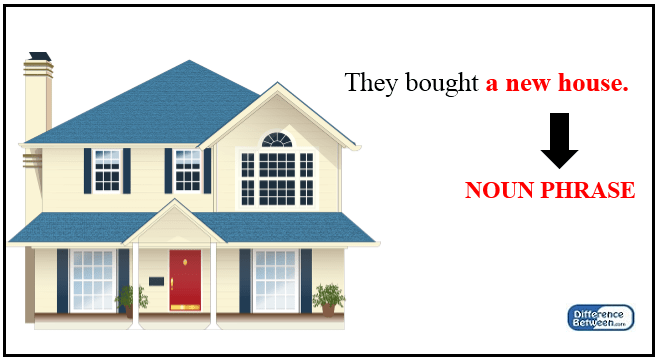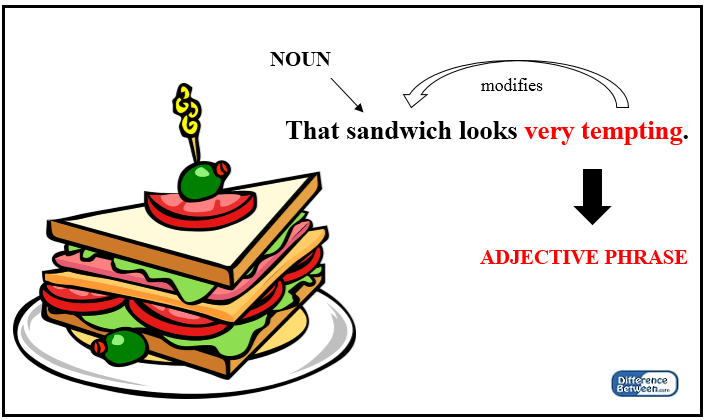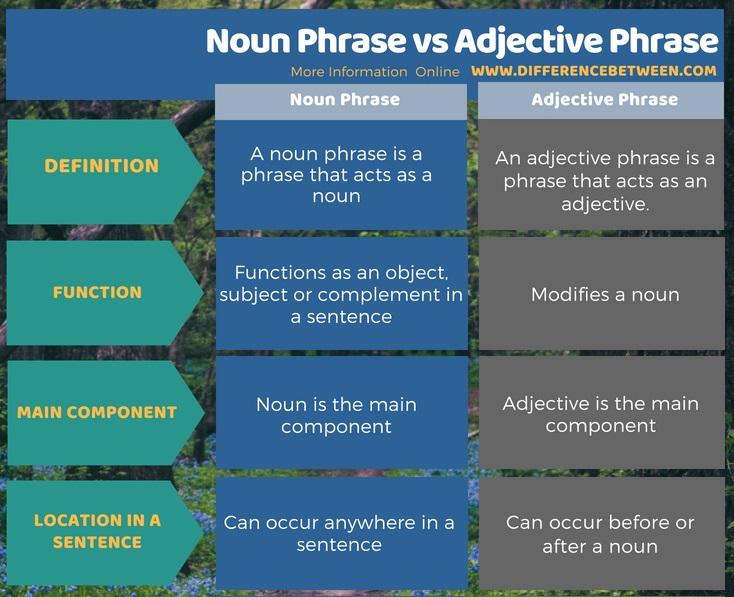Difference Between Noun Phrase and Adjective Phrase
The key difference between noun phrase and adjective phrase is their function; the noun phrase acts as a noun while the adjective phase acts as an adjective.
A phrase is a group of words that do not convey a complete thought. They are mainly used as parts of speeches and can be categorized into several groups according to their function. Noun phrase, adjective phrase, adverb phrase, prepositional phrase, verb phrase and infinitive verb are some of these categories.
CONTENTS
1. Overview and Key Difference
2. What is a Noun Phrase
3. What is an Adjective Phrase
4. Side by Side Comparison – Noun Phrase vs Adjective Phrase in Tabular Form
5. Summary
What is a Noun Phrase?
A noun phrase is basically a phrase that acts as a noun. A noun phrase typically includes a pronoun or a noun and its modifiers. The main word (head) in a noun phrase is a noun or a pronoun.
 Modifiers in a noun phrase can occur before or after the noun. The modifiers that come before the noun are articles, possessive pronouns, possessive nouns, adjectives, and/or participles. The modifiers that come after the noun include prepositional phrases, participle phrases, adjective clauses, and/or infinitives. Read the following example sentences to understand the structure and function of a noun phrase more clearly.
Modifiers in a noun phrase can occur before or after the noun. The modifiers that come before the noun are articles, possessive pronouns, possessive nouns, adjectives, and/or participles. The modifiers that come after the noun include prepositional phrases, participle phrases, adjective clauses, and/or infinitives. Read the following example sentences to understand the structure and function of a noun phrase more clearly.
- My elder brother got married yesterday.
- That big old house is for sale.
- He was scared of the snarling dog.
- That fat old lady is the last remaining chief of their tribe.
- He was the first Indian to receive an Olympic medal.
- The boy with the long hair ran fast.
A noun phrase can act as a subject, object or a complement, just like any noun.
What is an Adjective Phrase?
An adjective phrase is basically a phrase that acts as an adjective. Thus, an adjective phrase gives us some information about the noun that it modifies. Some examples of adjective phrases are as follows:
- I found a very small kitten.
- The lecture was extremely boring.
- He started a fund for children with heart defects.
- She wore a reddish-brown dress.
- I bought a cake decorated with green icing.
- Your offer sounds very tempting.
As evident from the above examples, the adjective is the header or the main component of an adjective phrase.

Similar to an adjective, an adjective phrase can occur either before a noun or after a noun. Thus, an adjective can act either as an attributive adjective or a predicative adjective.
What is the Difference Between Noun Phrase and Adjective Phrase?
A noun phrase is a phrase that acts as a noun whereas an adjective phrase is a phrase that acts as an adjective. Thus, an adjective phrase modifies a noun while a noun phrase functions as an object, subject or complement in a sentence. Moreover, the main component of a noun phrase is a noun whereas the main component of an adjective phrase is an adjective. Furthermore, a noun phrase can occur anywhere in a sentence while an adjective phrase occurs before or after a noun. The following infographic presents a side by side comparison of the difference between noun phrase and adjective phrase.

Summary – Noun Phrase vs Adjective Phrase
The basic difference between noun phrase and adjective phrase is that a noun phrase acts as a noun while an adjective phase acts as an adjective. Furthermore, a noun phrase can occur anywhere in a sentence as a subject, object or complement while an adjective phrase only occurs before or after a noun.
ncG1vNJzZmivp6x7pbXFn5yrnZ6YsqOx07CcnqZemLyue8OinZ%2Bdopq7pLGMm5ytr5Wau266zq6lZqiYp660sYyapZ1lkZm3pq%2FToq2eZaCdv6K%2FxGg%3D